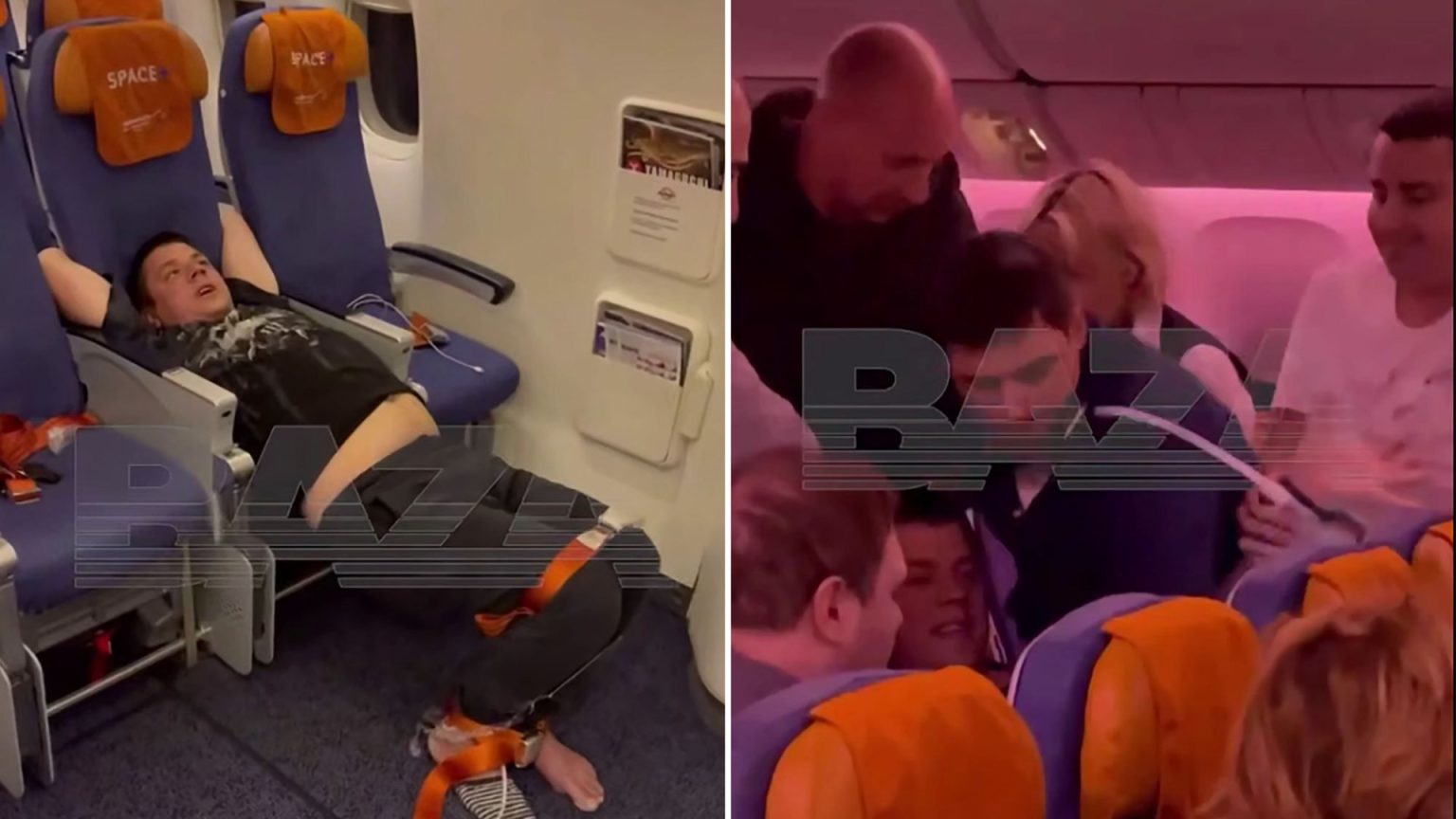A chaotic scene unfolded aboard a Dubai to Moscow flight when a passenger, identified as 38-year-old Roman Pakhomov, erupted into a drunken rage, forcing an emergency landing. Pakhomov’s disruptive behavior began with verbal abuse directed at both passengers and crew members. Fellow passengers initially intervened, managing to restrain him using seatbelts, effectively tying him to a seat. Video footage captured the struggle, showing Pakhomov wrestled to the floor and then bound with the improvised restraints. The flight crew, according to Russian media reports, also attempted to restrain Pakhomov with plastic handcuffs. However, these proved insufficient, as Pakhomov managed to break free and, in a shocking escalation, began striking the aircraft window with his fist. This act of violence prompted the pilot to make an emergency landing in Baku, Azerbaijan.
Upon landing at Heydar Aliyev International Airport, Azerbaijani authorities took Pakhomov into custody. Reports suggest that Pakhomov’s outburst was fueled by an unknown alcoholic beverage he had brought onboard the five-hour flight. The unscheduled stop in Baku resulted in a delay of two hours and 45 minutes before the flight could continue its journey to Moscow. Following the incident, and after regaining sobriety, Pakhomov claimed to have no recollection of his actions. An official investigation into the incident is currently underway.
This incident underscores the potential dangers posed by unruly passengers, particularly those under the influence of alcohol. The quick thinking and decisive actions of fellow passengers, who managed to restrain Pakhomov before he could inflict serious damage or harm, likely prevented a more serious outcome. The incident also highlights the challenges faced by airline crews in managing disruptive passengers, and the difficult decisions pilots must make to ensure the safety of all onboard.
This event echoes a similar incident earlier in December involving an easyJet flight from Morocco to Glasgow. In that instance, a drunk and disruptive passenger was removed from the plane by Portuguese police after the flight was diverted to Faro Airport. Video footage captured the moment of the passenger’s removal, met with applause from fellow travelers who had endured his abusive behavior. Reports indicated the passenger had been verbally abusive, spitting, and had received multiple warnings from the flight crew. Other passengers reported encountering the same individual behaving aggressively and drunkenly at their hotel.
These incidents highlight a recurring problem within the aviation industry: the disruption and potential danger posed by intoxicated passengers. While airlines have established protocols for handling such situations, these incidents demonstrate the need for continued vigilance and effective strategies to prevent and manage disruptive behavior. The safety and well-being of passengers and crew remain paramount, and further measures may be necessary to address this ongoing issue.
The consequences of disruptive behavior onboard aircraft can range from flight delays and diversions to potential safety risks. In addition to the inconvenience caused to fellow passengers, such incidents can result in significant financial costs for airlines, as well as legal repercussions for the individuals involved. Addressing the root causes of such behavior, including excessive alcohol consumption, and implementing effective measures to prevent and manage disruptive incidents are crucial for maintaining a safe and comfortable travel experience for all.
The use of passenger restraints, as seen in the Dubai to Moscow flight, underscores the seriousness of such situations. While effective in containing the immediate threat, such measures also highlight the need for better pre-emptive measures to prevent such incidents from occurring in the first place. Improved passenger screening procedures, stricter regulations regarding alcohol consumption onboard, and enhanced training for flight crews in managing disruptive behavior could all contribute to a safer and more pleasant travel environment.











